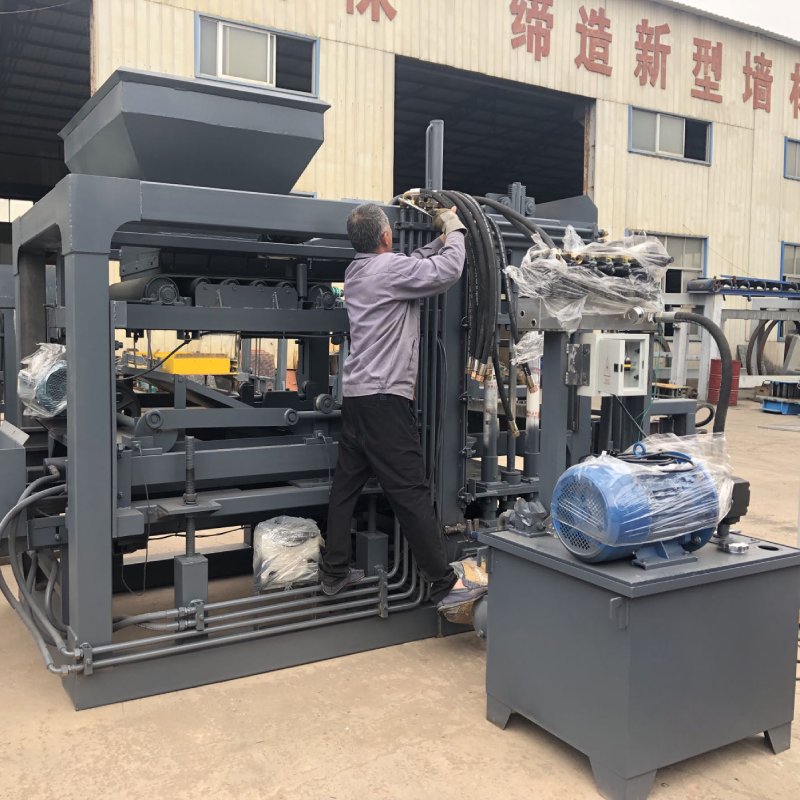
Image source Aiwei block machine
Micro Block Brick Making Machines Empower Small-Scale Businesses.
Introduction
In the dynamic world of construction, the demand for sustainable, cost-effective, and efficient building materials continues to rise. Small-scale businesses play a crucial role in meeting this demand, catering to local construction projects and community needs. Micro block brick making machines have emerged as game-changers for these enterprises, empowering them to produce high-quality bricks with minimal investment and manpower. In this article, we will explore the significance of micro block brick making machines, their features, benefits, and the transformative impact they have on small-scale businesses in the construction industry.
- The Rise of Micro Block Brick Making Machines
Traditional brick-making machines were often large, capital-intensive, and required significant human labor. However, the introduction of micro block brick making machines revolutionized the landscape for small-scale businesses. These compact, affordable machines are designed to cater to the needs of micro and small enterprises, making brick production accessible and profitable for local communities.
- Key Features of Micro Block Brick Making Machines
a. Compact Design: Micro block brick making machines are characterized by their small footprint and space-saving design. They can be easily installed and operated even in limited workspaces, making them ideal for small businesses with space constraints.
b. Manual or Semi-Automatic Operation: Depending on the model, micro machines can be manually operated or semi-automatic, reducing the need for skilled labor and enabling micro-business owners to handle production tasks themselves.
c. Cost-Effective: These machines are specifically designed to be affordable for small-scale businesses. They require minimal capital investment, making it easier for entrepreneurs to enter the brick manufacturing industry.
d. Versatility: Despite their compact size, micro block brick making machines can produce a wide range of brick sizes and types, offering flexibility to meet diverse construction requirements.
e. Energy Efficiency: Many micro machines are designed to minimize energy consumption, reducing operational costs for small-scale businesses.
- Advantages of Micro Block Brick Making Machines for Small-Scale Businesses
a. Affordable Entrepreneurship: Micro machines open doors for aspiring entrepreneurs to enter the brick manufacturing industry with minimal financial risk. They provide a low-cost, high-return investment opportunity for small-scale businesses.
b. Customization and Localized Production: These machines allow small businesses to tailor brick production to the specific needs of local communities and construction projects. This localized approach enhances customer satisfaction and supports community development.
c. Employment Generation: The operation of micro block brick making machines requires a small workforce, generating employment opportunities for local communities and stimulating economic growth.
d. Sustainable Practices: Many micro machines are designed to utilize recycled materials or environmentally friendly components, promoting sustainable construction practices and reducing the environmental impact.
e. Rural Development: Micro block brick making machines have a profound impact on rural development by providing essential building materials for local infrastructure projects and housing initiatives.
- Transformative Impact on Small-Scale Businesses
a. Empowerment through Ownership: Micro block brick making machines empower small-scale business owners to take control of their ventures, promoting a sense of ownership, independence, and self-reliance.
b. Access to Formal Markets: With the ability to produce high-quality bricks, small-scale businesses gain access to formal construction markets, opening doors to more significant projects and clientele.
c. Increased Profit Margins: The cost-effective nature of micro machines allows small-scale businesses to achieve higher profit margins, reinvest in their enterprises, and expand their operations.
d. Reduction of Import Dependency: By producing bricks locally, micro businesses reduce dependency on imported construction materials, contributing to the growth of domestic industries.
- Case Studies and Success Stories
a. Empowering Rural Entrepreneurs in India: Micro block brick making machines have been instrumental in empowering rural entrepreneurs in India. These machines have provided an affordable means for small businesses to contribute to local infrastructure development and housing projects.
b. Sustainable Brick Production in Africa: In several African countries, micro machines have supported sustainable brick production initiatives, utilizing locally available materials and minimizing environmental impact.
- Challenges and Future Prospects
a. Technical Training and Support: Small-scale businesses may face challenges related to technical expertise, machine maintenance, and troubleshooting. Providing training and after-sales support will be crucial for the successful operation of micro machines.
b. Access to Finance: Despite their affordability, small-scale entrepreneurs may still encounter difficulties in accessing finance for machine purchases. Collaborations with financial institutions and government support can address this challenge.
c. Market Awareness: Raising awareness about the benefits of micro block brick making machines among potential customers and construction stakeholders will expand market opportunities for small-scale businesses.
- Conclusion
Micro block brick making machines have unlocked opportunities for small-scale businesses in the construction industry, facilitating entrepreneurship and local development. Their compact design, cost-effectiveness, and versatility empower entrepreneurs to produce high-quality bricks, meet local construction demands, and contribute to sustainable building practices. As small-scale businesses continue to drive innovation and address the diverse needs of their communities, micro block brick making machines will remain an essential tool, fostering economic growth and transforming the construction landscape from the grassroots level.
